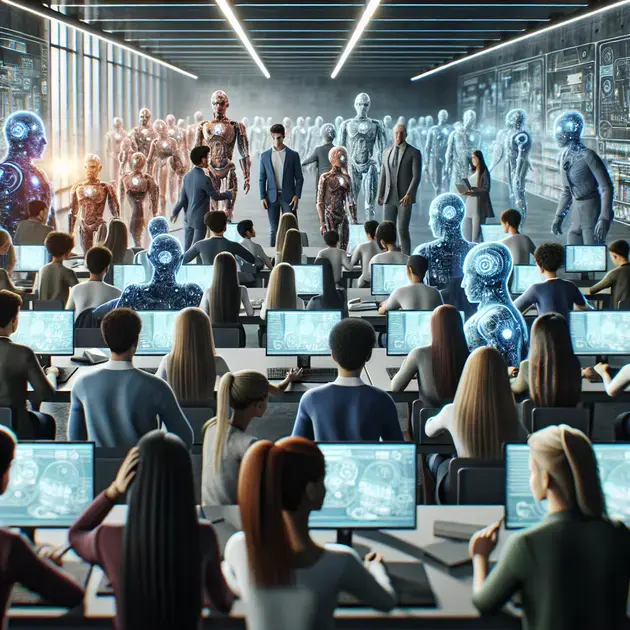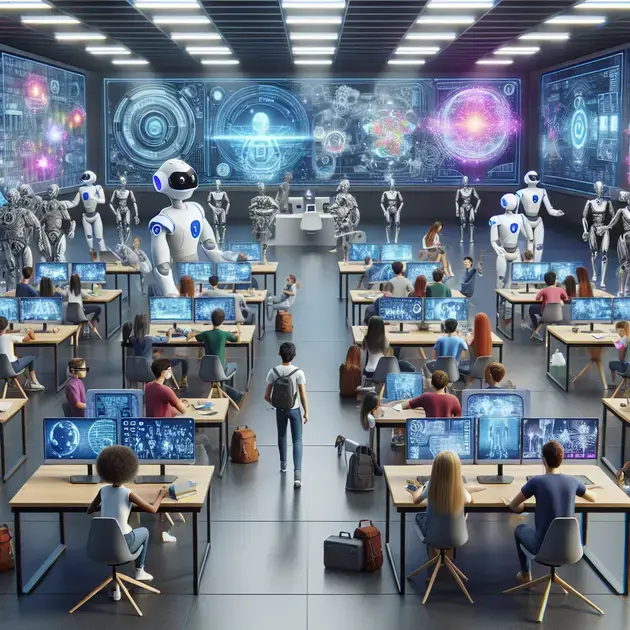Artificial Intelligence (AI) has significantly transformed various industries in recent years, and the field of education is no exception. The integration of AI technologies in education is revolutionizing the way students learn and educators teach, enhancing the overall learning experience.
With AI’s capabilities to analyze data, personalize learning paths, and provide instant feedback, students can receive a tailored education that suits their individual needs and pace. This technological advancement is fostering a more efficient and effective educational environment, preparing students for the challenges of the future.

Revolutionizing Learning Methods
Education is constantly evolving, with new technologies playing a significant role in revolutionizing traditional learning methods. One of the most impactful changes in recent years has been the widespread adoption of online learning platforms. Platforms like Coursera, Khan Academy, and Udemy offer a wide range of courses on various subjects, allowing students to learn at their own pace from anywhere in the world.
To revolutionize your learning experience, start by researching different online platforms to find one that best suits your needs. Create an account on the platform of your choice and browse through the course catalog to find topics that interest you. Once you’ve selected a course, enroll in it and follow the instructions provided to access the learning materials.
Another way to revolutionize learning is by incorporating gamification into the educational process. Apps like Duolingo and Kahoot! use gamified elements to make learning more engaging and fun. By setting goals, earning points, and competing with friends, students are motivated to actively participate in their learning journey.
Furthermore, the use of virtual reality (VR) and augmented reality (AR) technologies is transforming how students interact with educational content. Apps like Google Expeditions and Nearpod VR allow students to explore virtual environments and engage with immersive learning experiences, making complex concepts easier to understand.
By embracing online platforms, gamification, and emerging technologies like VR and AR, educators and students can revolutionize traditional learning methods and create a more engaging and effective learning environment.
Personalizing Education with AI
Artificial intelligence (AI) is reshaping the way education is personalized to meet the needs of individual students. Adaptive learning platforms like DreamBox and Knewton use AI algorithms to analyze student performance data and provide personalized learning pathways tailored to each student’s strengths and weaknesses.
To personalize your education with AI, start by creating an account on an adaptive learning platform of your choice. Complete any initial assessments to help the platform gather data on your learning preferences and capabilities. Based on this data, the platform will recommend personalized lessons and activities to help you achieve your learning goals.
Another way AI is personalizing education is through virtual tutors and chatbots. Apps like Socratic and Brainly use AI-powered chatbots to provide instant explanations and assistance on homework problems. These virtual tutors can answer questions, provide feedback, and offer personalized study tips to help students improve their understanding of difficult concepts.
AI-powered recommendation systems are also transforming the way students discover educational content. Platforms like Netflix and Spotify use similar algorithms to recommend movies and music based on user preferences. Likewise, educational platforms like Khan Academy and TED-Ed recommend video lessons and talks that align with a student’s interests and learning style.
By leveraging AI technologies in education, students can receive personalized learning experiences that cater to their unique needs, preferences, and learning styles, ultimately enhancing their academic success.
Preparing Students for the Future
As the world continues to evolve rapidly, it is crucial to prepare students for the future by equipping them with the skills and knowledge they need to succeed in an ever-changing landscape. One way to do this is by integrating coding and computer science education into the curriculum. Platforms like Code.org and Scratch offer free coding tutorials and resources to help students develop computational thinking and problem-solving skills.
To prepare students for the future, schools and educators can also emphasize the importance of critical thinking and creativity in the learning process. Encouraging students to think critically, analyze information, and think outside the box fosters innovation and prepares them to tackle complex challenges in the future.
Furthermore, it is essential to teach students digital literacy skills to navigate the digital world effectively. Platforms like Common Sense Education provide resources for teaching students about online safety, digital citizenship, and media literacy, empowering them to use technology responsibly and ethically.
Preparing students for the future also involves cultivating soft skills such as communication, collaboration, and adaptability. Educational apps like Classcraft and Flipgrid encourage teamwork, communication, and creativity through interactive activities and projects, helping students develop essential interpersonal skills for success in the future.
By focusing on coding education, critical thinking, digital literacy, and soft skills development, educators can effectively prepare students for the future workforce and empower them to thrive in a rapidly changing world.

Revolutionizing Learning Methods
Education in the 21st century is undergoing a revolutionary transformation thanks to innovative learning methods. Today, students have access to a wide range of tools and resources that cater to different learning styles and preferences. Incorporating technology in the classroom has enabled teachers to create engaging and interactive learning experiences that enhance student learning outcomes. With the rise of online education platforms and virtual classrooms, students can now learn at their own pace and receive personalized feedback from teachers in real-time.
One of the key aspects of revolutionizing learning methods is the implementation of artificial intelligence (AI) in education. AI algorithms can analyze student data and provide insights into each student’s learning preferences, strengths, and areas for improvement. By leveraging AI-powered tools, educators can personalize lesson plans and instructional materials to meet the individual needs of each student. This level of personalization helps students stay engaged and motivated to learn, leading to better academic performance.
In addition to AI, gamification is another effective learning method that is revolutionizing education. By incorporating game elements such as points, badges, and leaderboards into educational activities, teachers can make learning more interactive and enjoyable for students. Gamification encourages healthy competition among students and provides instant rewards for their achievements, making the learning process more engaging and effective.
Furthermore, project-based learning is gaining popularity as a revolutionary method that promotes hands-on experience and collaboration among students. Instead of traditional lectures and exams, students work on real-world projects that require critical thinking, problem-solving, and teamwork skills. This approach not only prepares students for the future workforce but also fosters creativity and innovation in the classroom.
Overall, by embracing innovative learning methods such as AI, gamification, and project-based learning, educators can revolutionize the way students learn and prepare them for success in the ever-evolving digital age.
Personalizing Education with AI
As technology continues to advance, the field of education is leveraging artificial intelligence (AI) to personalize the learning experience for students. Personalization in education refers to the customization of teaching methods, content, and pace of learning to suit the individual needs of each student. AI algorithms play a crucial role in analyzing student data, identifying learning patterns, and adapting instructional strategies to optimize student engagement and academic performance.
One of the key benefits of personalizing education with AI is the ability to provide immediate feedback to students. With AI-powered assessment tools, teachers can track student progress in real-time and offer personalized feedback based on individual strengths and weaknesses. This targeted feedback helps students identify areas for improvement and allows educators to tailor their teaching approach to ensure student comprehension and mastery of the material.
Furthermore, AI can assist in creating adaptive learning pathways that adjust to each student’s learning pace and style. By leveraging machine learning algorithms, educational platforms can recommend customized learning resources, activities, and assessments that align with the student’s learning objectives. This personalized approach not only enhances student engagement but also fosters a sense of autonomy and self-directed learning.
Moreover, AI-powered virtual tutors and chatbots are revolutionizing the way students receive support outside the classroom. These intelligent systems can provide on-demand assistance to students, answering questions, explaining concepts, and guiding them through challenging problems. Personalized virtual tutors offer students the opportunity to learn at their own convenience and receive immediate help whenever they encounter difficulties in their studies.
In conclusion, personalizing education with AI is redefining the traditional classroom experience and empowering students to take control of their learning journey. By harnessing the power of AI technologies, educators can create tailored learning experiences that cater to the diverse needs and learning styles of students, ultimately preparing them for success in the future.
Preparing Students for the Future
The rapid advancements in technology and the changing nature of the workforce have highlighted the importance of preparing students for the future. To thrive in the digital age, students need a combination of academic knowledge, critical thinking skills, and adaptability to navigate complex and unpredictable environments. Educators play a vital role in equipping students with the necessary competencies to succeed in a rapidly evolving society.
One of the key strategies for preparing students for the future is fostering a growth mindset that emphasizes resilience, perseverance, and a willingness to learn from failures. By cultivating a growth mindset, educators can instill in students the confidence to take on challenges, experiment with new ideas, and continuously improve their skills. This mindset shift promotes a lifelong learning attitude that is essential for success in the fast-paced and dynamic world.
Additionally, promoting interdisciplinary learning is essential for preparing students for the multifaceted demands of the future workforce. By integrating diverse subjects such as science, technology, engineering, arts, and mathematics (STEAM), educators can help students develop a holistic understanding of complex issues and cultivate innovative thinking. Interdisciplinary learning encourages students to think creatively, collaborate across disciplines, and approach problems from multiple perspectives.
Furthermore, teaching essential 21st-century skills such as digital literacy, communication, collaboration, and critical thinking is crucial for preparing students for the future. These skills are not only applicable in the workplace but also in everyday life, enabling students to adapt to new technologies, communicate effectively, work in teams, and make informed decisions. By prioritizing the development of these skills, educators can empower students to thrive in an increasingly digital and interconnected world.
In conclusion, preparing students for the future requires a holistic approach that combines academic knowledge, essential skills, and a growth mindset. By equipping students with the tools and competencies needed to succeed in the 21st century, educators can empower the next generation to thrive in a rapidly changing world.
**
Conclusion
**
Education in the 21st century is experiencing a profound transformation through innovative learning methods. With the integration of technology in the classroom, students now have access to a diverse array of tools and resources tailored to their individual learning styles. The advent of online education platforms and virtual classrooms has enabled personalized learning experiences, enhancing student outcomes significantly. By embracing new methodologies like AI, gamification, and project-based learning, educators are revolutionizing the learning environment to prepare students effectively for the digital age.
The utilization of artificial intelligence (AI) in education plays a pivotal role in personalizing the learning journey for each student. AI algorithms analyze student data to discern learning patterns and areas for improvement, facilitating tailored lesson plans and instructional materials. This level of personalization fosters student engagement and motivation, ultimately boosting academic performance. Additionally, AI-driven adaptive learning pathways and virtual tutors provide immediate feedback and assistance, empowering students to take control of their education independently.
To prepare students for the future, educators must focus on instilling a growth mindset that emphasizes resilience, perseverance, and continuous learning. By nurturing interdisciplinary learning encompassing STEAM subjects, students can develop a comprehensive understanding of complex issues and enhance innovative thinking. Equipping students with essential 21st-century skills such as digital literacy, communication, and critical thinking is crucial for their success in both professional and personal spheres. By adopting a holistic approach that combines academic knowledge, skills development, and a growth mindset, educators are paving the way for the next generation to thrive in an ever-evolving world.